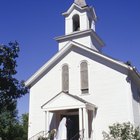
In the U.S., parents are unlikely to be aware of any difference between a for profit and a non-profit day care center. However, there are some significant financial benefits to applying for non-profit status in the form of grants and government funding. Most non-profit day care centers are administered by a board of directors or trustees which often includes parent members, thereby giving parents a chance to participate in the administrative issues.
501(c)(3) Status
A non-profit school should be registered as a corporation and organizers must apply to the Internal Revenue Service for 501(c)(3) non-profit status using Form 1023. The application must include a non-discriminatory statement in its charter or bylaws and organizers must understand the federal discrimination laws and keep records showing the racial composition of the student body, teachers and administrative staff. The applicants must also provide a mission statement describing their operations. Approval as a 501(c)(3) corporation means that the school will be exempt from Federal income tax.
Grants and Funding
Non-profit day care centers are eligible for federal, state and private grants. These are not usually available to for-profit schools and help substantially to enable centers to purchase more educational materials and to train their staff, thereby attracting more qualified personnel. The funding can also be used to maintain and upgrade the school facilities. Because of the extra funding, non-profit schools are able to reach out to underprivileged families and provide them with child care that they would otherwise not be able to afford.
Church Schools
Churches automatically receive 501(c)(3) status as long as they adhere to guidelines set by the IRS. If a day care operates under the umbrella of the church, that same status applies. Some churches decide to create ministries like day care programs as separate entities, in which case the day care must apply for 501(c)(3) status separately.
Regardless of the arrangement, church schools are typically not for profit. They are usually located on or adjacent to the church property and are administered by the church board of trustees. They can receive funding from the church itself as well as federal and state grants and private organizations and congregants. Church day care centers provide a faith-based education curriculum, and children's school fees may be determined on a case-by-case basis.
Profit Day Care Centers
Day care centers that have not applied for non-profit status may struggle to make ends meet and find it difficult to maintain their facilities. Those that are located in more affluent areas are less likely to have this problem as they are able to charge higher fees and parents often volunteer to hold fund raising events or may be willing to donate substantial amounts when the school needs more funds.
Related Articles

How to Start a Booster Club With Parents

How to Plan a Tent Revival

How to Start a Christian School

How to Advertise in Church Bulletins

How to Start an Adult Day Care Center ...

Do You Have to Be Bonded to Be a Church ...

Pennsylvania Grants for Adopted Children

How to Get Rental Assistance for Seniors

How to Start a High School Alumni ...

How to Start an After School Program in ...

How to Open a Daycare Center in ...

What Are the Duties of a Church Trustee ...

How to Organize a Church Bazaar

Funding for Christian Projects

Government Grants for Churches

How to Apply for a Commercial Loan for ...

The Definition of Non-Cognitive Skills

How to Make Money Hosting a Foreign ...

Grants for Private Christian Schools

Who Gives Donated Vehicles to the Poor?
References
Resources
Writer Bio
Trish Jackson is an author, blogger and freelance writer. Her second romantic suspense novel, "Redneck P.I.," was released in March 2011. Jackson particularly likes to write articles relating to life in the country, animals and home projects and has kept a blog focusing on this since 2006.
Photo Credits
Jupiterimages/Goodshoot/Getty Images